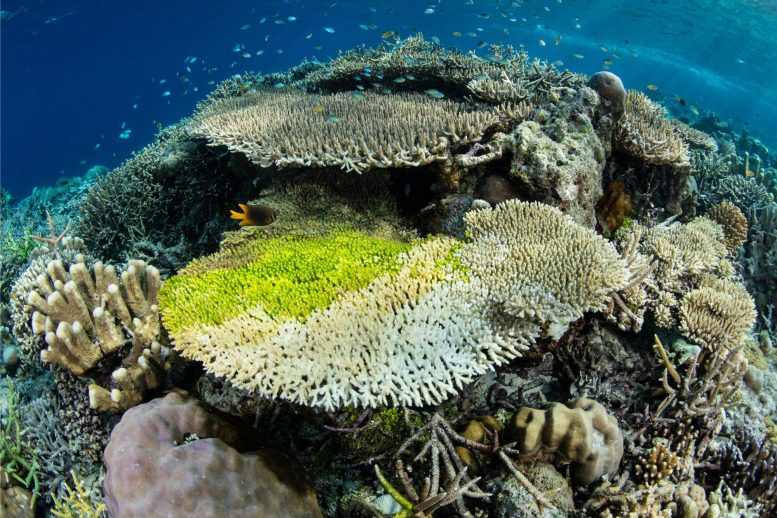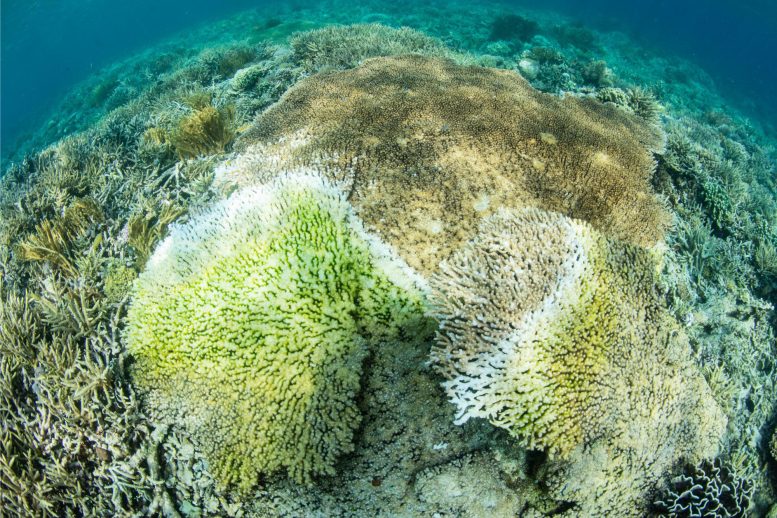
Climate change is fueling a surge in coral disease, threatening reef ecosystems worldwide. Rising ocean temperatures weaken corals’ immunity, making them more susceptible to bacterial and fungal infections. Without urgent climate action, coral disease could become widespread by 2100.
Global warming is leading to the increased spread of deadly coral disease, which, according to new research, is predicted to become endemic to reefs worldwide by the next century.
The research, recently published in the journal Ecology Letters, demonstrates the potential severity of climate change impacts on coral health. It warns of the potential eradication of entire reef ecosystems and the subsequent detrimental effects on coastal populations.
For the meta-analysis, researchers from UNSW Sydney analyzed 108 studies of coral health where coral reefs were surveyed for disease symptoms. They then linked the disease surveys to ocean sea surface temperature records to understand how climate change – specifically ocean warming – has influenced coral disease prevalence worldwide and performed modeling to forecast disease under future warming scenarios.
They found coral disease increased with ocean temperatures over time, tripling over the past 25 years to 9.92 percent globally. Their modeling also predicts disease prevalence can increase to 76.8 percent in 2100 if temperatures continue to rise on the same trajectory – the most conservative worst-case scenario.
Samantha Burke, lead author of the study and a Ph.D. candidate at the School of Biological, Earth & Environmental Sciences, says the findings highlight the devastating impacts of rising temperatures on coral reefs and the dire need for swift action to mitigate climate change.

“Coral disease is a serious cause of coral mortality globally and reef decline, and our modeling predicts it will only continue to worsen – even if ocean temperatures remain conservative,” Ms. Burke says.
The study also suggests coral disease is likely to worsen more in the Pacific Ocean than in the Atlantic Ocean or Indian Ocean based on current data.
“Particular oceans are more at risk, but it’s difficult for us to know whether that is solely from warming ocean temperatures or combined with the many other stressors coral face,” Ms. Burke says. “But what is clear is that coral disease prevalence is climbing across the globe, and without urgent action to address warming temperatures, more coral will become diseased.”
An Ecosystem on the Brink
Coral reefs play a critical role in the marine ecosystem, supporting around a quarter of the world’s fish. They’re also vital for coastal communities who rely on the reef for fisheries and tourism, as well as the protections they provide from storms and coastal erosion.
“They are the habitat builders. Without coral, there is no reef environment and no coastal industry,” Ms Burke says.
Coral disease occurs when the coral’s immune system is compromised, usually after becoming infected by a pathogen – like bacteria or fungi – that causes disease in the animal. It is different from coral bleaching, which is when corals turn white under stress by expelling the zooxanthellae algae that live inside their tissue responsible for coloration.
“Certain diseases act more quickly than others, but most corals that get diseased end up dying from it,” Ms. Burke says. “Because reefs take a long time to establish, the coral may not recover, and entire sections of the reef can be lost.”
Corals are sensitive organisms and require a precise range of environmental conditions to survive, including water temperature, salinity, and quality. Living outside this normal range can make corals ‘stressed’ – less able to grow, reproduce and ultimately survive.
Why Warming Oceans Weaken Coral Immunity
Though infectious pathogens like bacteria and fungi ultimately cause coral disease, stressed corals are more vulnerable to infection. Rising water temperatures may also increase the virulence or growth rate of disease-causing organisms.
“As the ocean warms, it increases coral stress which can decrease its immune response,” Ms Burke says. “Increasing temperatures can also create more favorable conditions for the pathogen causing disease.”
Many diseases that affect corals are known by their appearance, such as black band disease or yellow band disease. But scientists have yet to identify many of the disease-causing pathogens.
“It’s still relatively unknown whether the microbes associated with diseased coral are the cause or a symptom of disease, just that the coral is sick, and the tissue is dying,” Ms. Burke says. “Whether the fungi or bacteria present caused disease or merely fed on the dying tissue is unclear, so researchers need to study it further.”
Ms. Burke says more research into coral disease will also help scientists develop effective disease interventions and demonstrate the complexity of threats that coral reef ecosystems are now facing.
“The solution to coral disease is likely complex and needs action on a large and small scale. We can’t just wait around and hope for a silver bullet like a universal antibiotic,” Ms. Burke says.
“Given what’s at stake, we need to take many steps forward to develop effective mitigation strategies, and addressing increasing temperatures would be a great place to start.”
Reference: “The impact of rising temperatures on the prevalence of coral diseases and its predictability: A global meta-analysis” by Samantha Burke, Patrice Pottier, Malgorzata Lagisz, Erin L. Macartney, Tracy Ainsworth, Szymon M. Drobniak and Shinichi Nakagawa, 6 June 2023, Ecology Letters.
DOI: 10.1111/ele.14266
Never miss a breakthrough: Join the SciTechDaily newsletter.